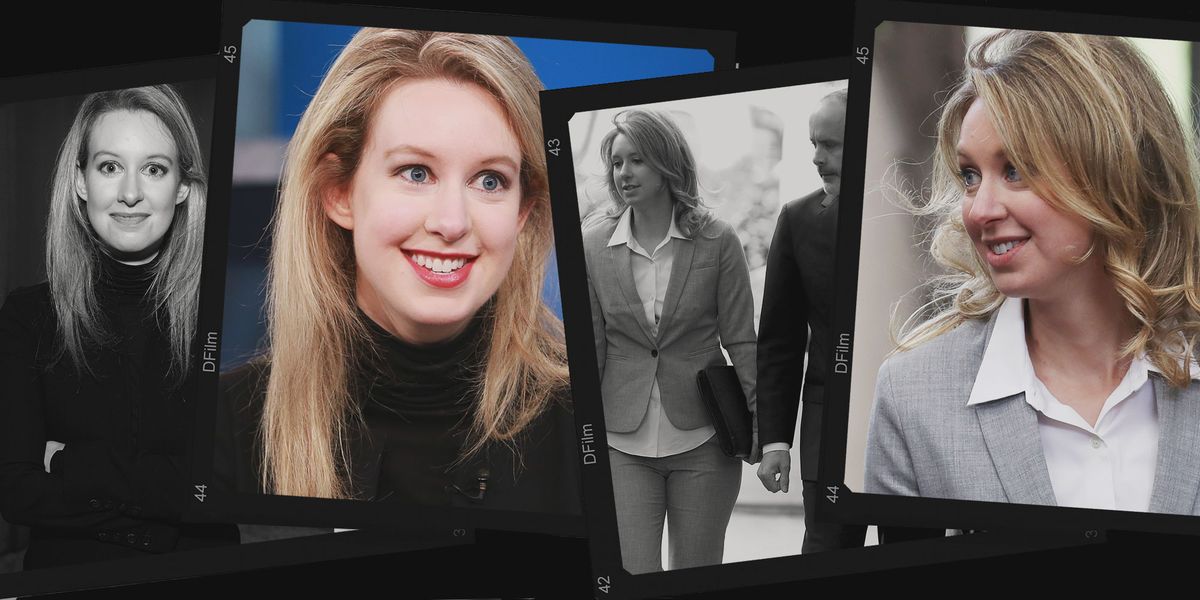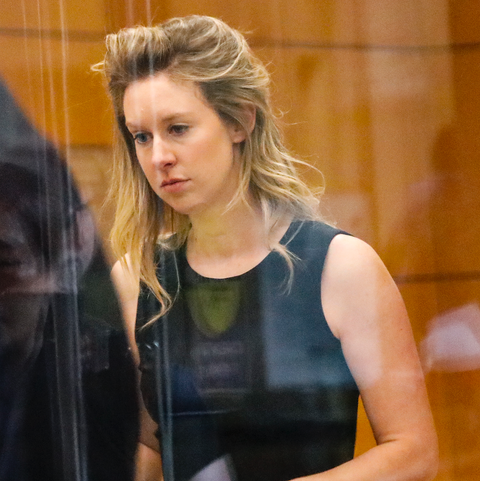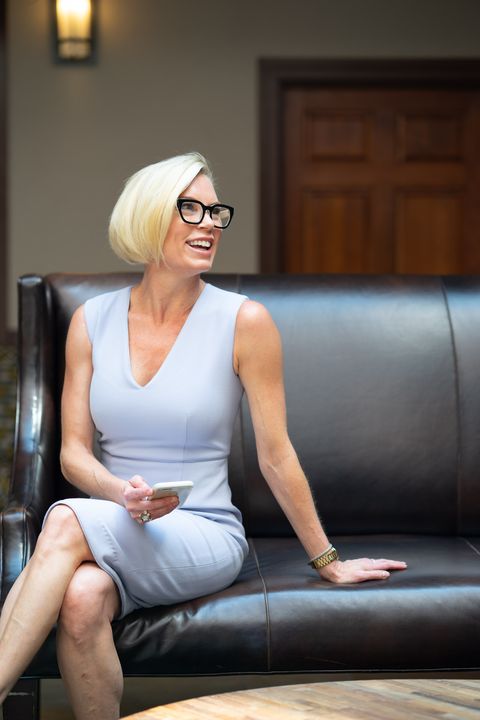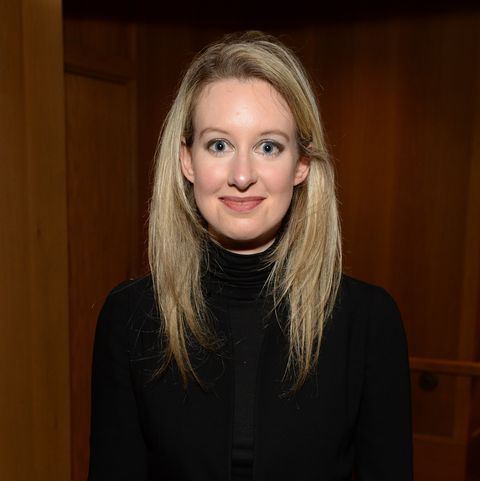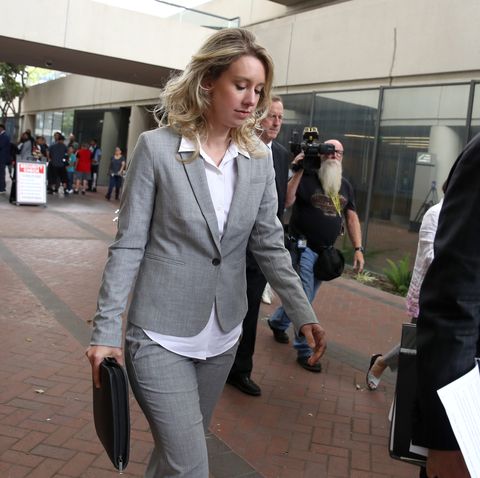Elizabeth Holmes is known for many things: A now-defunct blood testing company once valued at $9 billion, a possibly faked deep voice, and a signature look of bleached-blonde hair, Kohl-rimmed eyes, and, of course, a Steve Jobs-esque black turtleneck. Much like any exec who adopts a uniform, these pieces told a story about Holmes, one that added to an air of confidence about her company, Theranos, and where it would be going in the future.
But ever since cracks in her supposed genius-veneer began to show (and the tech empire she spent years building subsequently came tumbling down) the mogul has done a fashion 180. Now a fixture on the courtroom scene, her style has softened, in favor of a new, less-tightly wound look. At a status hearing earlier this week, the reported newlywed wore a black crew-neck tank and blazer, her now-highlighted locks in beachy waves.
Last month, during a pre-trail hearing in federal court in San Jose, Holmes—who faces fraud charges and up to 20 years in prison—donned a light grey blazer, teamed with a dewy complexion and highlighted hair styled into large, ready-for-reality-television curls. She was almost unrecognizable, more Barbie doll than beleaguered entrepreneur. One Twitter user even likened her new hair to, “child beauty pageant curls.”
What could her ping-ponging sartorial efforts mean?
According to Tara Trask, a courtroom style expert and trial consultant who has worked with a number of high-profile female clients including Oprah Winfrey, the shift in appearance could certainly be a deliberate ploy to alter public opinion of the accused scammer.
“I’m assuming what Elizabeth was thinking was, ‘Well, I’m going to soften my look,” Trask tells ELLE.com “I’m going to soften the way I appear to people. I want to appear more feminine, as if I need saving and maybe that’ll get me out of this mess.” The expert continues, “There’s nothing wrong with cleaning up your act and trying to look more professional, but the swing makes it seem like she’s thinking, ‘If I play to my feminine qualities, that’s going to help me get out of this jam.’ ”
Is it working?
Trask believes the opposite—the strategy will backfire when her case goes to trial next summer. “First of all, the jurors will Google her,” she says. “The court tells them not to, but they will. They’ll see what she looked like before, and compare that to how she looks today. In my opinion, it almost looks like she’s putting on costumes, which makes the jury question, ‘Who are you really? Which one is your true self?’”
“It’s pretty clear,” she adds, “that nobody who is a professional and nobody who does this for a living is advising Elizabeth [on her courtroom style].”
In high-profile cases, for better or for worse, a courtroom appearance can sometimes seem like a runway show. Paparazzi camp out in front of courthouses to capture photos, and a defendant’s image often ends up as Internet fodder.
Take, notorious grifter Anna Sorokin, who recruited former Glamour magazine staffer Anastasia Walker to select her trial outfits in March. At the time, Walker told ELLE.com that she was dressing the now-imprisoned criminal in Saint Laurent, Michael Kors, and Victoria Beckham because, “[trial] photographs can be saved, potentially, forever.” Walker was right, it didn’t take long for Sorokin’s looks to garner their own Instagram account.
And, let’s not forget about that infamous white Kimberly Ovitz dress Lindsay Lohan wore while pleading not guilty to stealing a necklace in 2011. “Lindsay Lohan’s Courtroom Outfit Inappropriate?” read one CBS News headline. (“what i wear to court shouldnt be front page news. it’s just absurd,” she tweeted in response.)
Just last week, Cardi B responded to a New York Post article likening her appearance at the Queens Supreme Court in a two-toned designer suit from Barneys to a “glamorous red-carpet photo op, dressing—and preening—for the eyes of a worldwide audience.” In a since-deleted Instagram video, the rapper vented: “Where am I supposed to get my suits from bro?! H&M?! I don’t dress inappropriate when I go to court. I dress like a f–king lady.”
Scrutiny over courtroom style is exactly why Trask suggests a defendant take every precaution to avoid drawing attention to themselves. “An outfit really just needs to be appropriate for the setting,” she explains. “And you need to look nice, but it shouldn’t be memorable. If it’s memorable, it was probably too much.”
Before a big case, Trask sits down with her clients to go over their appearance, suggesting handbags without logos for women, paired with dresses or pantsuits in muted colors like gray, charcoal, and navy. It’s always better, she adds, to wear a blouse over a starched Oxford.
“It can look too severe,” she explains. “You want to look professional and you want to look like you’re paying deference to where you are. A scarf or a blouse gives an outfit the perfect slight feminine twist.”
Hair should generally be pulled back from the face and look clean. In fact, according to Trask, the more natural it looks, the better.
“If I had a client that had so many photographs and things out there in the world that could be seen, I would never suggest a 180 in style of this degree,” says Trask. “It makes a jury question, ‘Who are you, which one are you?’ Then, it can lead a jury think, ‘Well, if you’re neither one, then who are you really?’ ”
